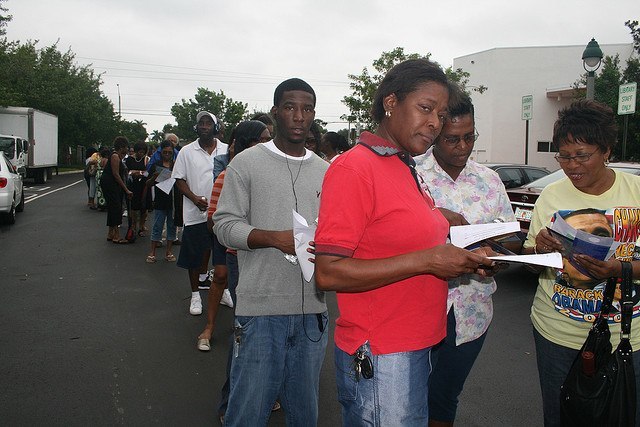
New Age Voter Suppression is Being Closely Watched by Groups With a Long History of Activism
Democracy, elections and voting at Democracy Chronicles
National Organizations Call On State Election Officials to Protect Voters From Intimidation and Harassment
With less than a month to go before Election Day 2012, an alliance of civil rights, human rights and other organizations sent letters yesterday to the chief election officials in 10 battleground states calling on them to take steps to protect American voters from unlawful intimidation and harassment at the polls.
“The right to vote is the most precious right of every American citizen and the most fundamental principle of our great democracy,” said Arlene Holt Baker, Executive Vice President, AFL-CIO. “And so we are asking secretaries of state, in their roles as chief election officials, to take a few simple but vital actions to protect the integrity of our elections, and ensure that every eligible American can cast a ballot without being wrongfully harassed or illegally challenged.”
The letters—which were sent to officials in Arizona, Colorado, Florida, Michigan, New Mexico, Nevada, Ohio, Pennsylvania, Texas, and Virginia—ask elections officials to ensure election integrity by preparing their poll workers to properly deal with those who might interfere with voters through intimidation.
Civil rights leaders are concerned with mounting threats of voter intimidation from groups such as True the Vote. Created by the Texas-based tea party group King Street Patriots, True the Vote operates nationally, and has announced its intention to mobilize a million recruits to challenge and confront Americans in swing states as they go to the polls in November. They say they want to make the experience of voting “like driving and seeing the police following you.” Their stated goal is to challenge 95,000 Americans who vote.
“Upholding the integrity of our voting system means ensuring that all eligible Americans have the access and opportunity to participate and make their voices heard. We are committed to that goal, and will work with election officials to make sure that the rights of all Americans to vote and have that vote counted are respected,” said Clarissa Martinez De Castro, Director of Civic Engagement of the National Council of La Raza.
In Ohio, for example, where early voting is underway, a True the Vote affiliate has launched a campaign of challenges that targets college students, low-income residents, homeless people, and people of color in 13 counties. Already, eligible voters have come forward to complain that they have been wrongfully and unlawfully targeted.
“Voter intimidation is not new to America,” said Gary L. Flowers, Executive Director and CEO, Black Leadership Forum. “Those who wore bib overalls in the twentieth century are no different from those who wear Abercrombie & Fitch clothing today while intimidating voters. Both are un-American examples of domestic terrorism.”
The Voting Rights Act of 1965 and the National Voter Registration Act of 1993 prohibit challenging any citizen’s right to vote based upon race or other characteristics, and prohibit the intimidation of any person for exercising their right to vote. Although challenges are permitted under various state laws, challenges that are frivolous or based on insufficient evidence of ineligibility are not allowed.
“What we’ve seen too often in recent years is partisan groups casting a wide-net in minority communities, attempting to intimidate eligible voters, create chaos, and slow down voting in targeted precincts,” said Niel Ritchie, Executive Director of the League of Rural Voters. “These illegal challenges undermine the integrity of our elections, and have no place in our democracy.”
While most Americans have a smooth and positive experience at the polls, polling places are often crowded and sometimes chaotic during voting hours, and an aggressive challenge campaign can easily disrupt voting if poll workers are unprepared for how to handle them. The letters lay out several simple, concrete steps that secretaries of state should take to prevent challengers from violating the law, and to ensure that voting goes smoothly and efficiently for everyone:
- Provide guidance to all election personnel and party-designated challengers on the requirements of state and federal law regarding challenges. This includes informing all parties that challenges based on race, ethnicity, national origin, language, or religion, for example, are impermissible under federal law. Challenges must be based on criteria as established by law, and polling place officials should be directed to keep records of any challenges in order to evaluate whether laws have been violated.
- Aside from issues of legality, challenges often result in delays and long lines at targeted polling places, whether that is their intention or not. Secretaries of state should clearly establish procedures that minimize disruption due to challenges, to ensure that voters waiting behind a challenged voter will not be inconvenienced, and discouraged voters will not be forced to leave without voting.
- Secretaries of state should establish clear channels of communication with state and federal law enforcement authorities in advance of Election Day (and/or early voting). Election officials should set up meetings with law enforcement officials, to clarify their authority in addressing disruptions and ensure their support in combating voter intimidation and harassment.
“What we want is simple,” said Barbara Easterling, President, Alliance for Retired Americans. “We want every eligible American voter to have a positive, hassle-free experience at the polls, and we want to encourage election officials to take some easy, concrete steps, in advance of the election, to make sure that happens. Our democracy works best when every American participates.”
Leave a Reply